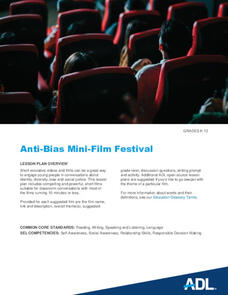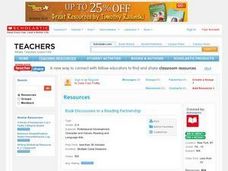Text Organization Teacher Resources
Find Text Organization lesson plans and worksheets
Showing 1,023 resources
Lesson Planet Curated
Comparisons and Contrasts
Paying attention to details is the heart of compare and contrast activities. The resources in this collection are designed to get learners thinking about how objects, ideas, characters, and/or situations are alike and how they are...
It's About Time
Organizing a Store
When provided with multiple objects, how many ways can the class organize and display them based on predetermined factors? Assist class members with a handy activity—theoretically teaching them concepts to understand periodic table...
EngageNY
Mid-Unit 3 Assessment, Part II: Organizing Notes for a Public Speech
It's all a matter of opinion! Pupils take Part II of the mid-unit assessment, in which they continue organizing their notes in preparation for writing an opinion speech. Using the resource, they add reasons, evidence, and a concluding...
Curated OER
Evernote
Here is an app version of a powerful tool that allows you and your students to have one place where you can capture, organize, and share items in multiple media formats. The different uses for this app are as varied as your ideas and...
EngageNY
Organizing an Opinion, Reasons, and Evidence: Expert Group Text 3
Let's race to the finish line. Scholars read an informational text about a chosen athlete. While reading, they add evidence and reasons to a graphic organizer to support their opinions about how their athlete broke barriers.
Anti-Defamation League
Anti-Bias Mini-Film Festival
Imagine a resource that provides all the materials you need to organize a film festival. Imagination becomes a reality with a five-star resource that has done all the work for you. Eight different award-winning short films are featured...
Great Books Foundation
Discussion Guide for Handmaid's Tale
Great literature discussions are a consequence of carefully crafted questions, interpretative questions that permit more than one response, and responses supported by specific evidence from the text. The discussion questions in a guide...
Curated OER
Collect and Organize Data - Practice 14.1
In this data collection worksheet, students read the word problem and study the tally chart about favorite sports. Kids then use the information in the chart to answer the questions. Students then use the list about students' favorite...
EngageNY
Mid-Unit 3 Assessment, Part I: Short Constructed Response and Organizing Notes for a Public Speech
It's time to put pen to paper. Scholars complete the first part of the mid-unit 3 assessment, writing a short constructed response about international aid following a natural disaster. Next, pupils use informational texts and note...
Crash Course Kids
Organizing Properties
Gain insight into how scientists group materials based on their properties, such as conductibility and malleability, with this informative and engaging video. First, molecules, atoms, substances, and elements are reviewed, then an...
Core Knowledge Foundation
Second Grade Skills Unit 6: The War of 1812
An English language arts unit closely examines spelling, grammar, reading, and writing skills. Scholars practice spelling patterns and tricky words. A read-aloud details the War of 1812 and introduces adverbs, and a close reading looks...
Hood River County School District
Text Structure: Features and Organization
Teach learners how to interact with both fiction and non-fiction text with a packet of activities and worksheets. After looking over text structure and the difference in text features between different types of writing, readers analyze...
EngageNY
Organizing an Opinion, Reasons, and Evidence: Text 1 for Each Expert Group
Working in small groups, scholars continue reading an informational text about either Roberto Clemente or Althea Gibson. As they read, pupils create graphic organizers in their journals to help map their ideas logically.
Curated OER
Analyzing Two or More Nonfiction Texts
How does recognizing the author's purpose help you draw conclusions about a topic? Using two articles (both are attached), learners brainstorm why each author wrote each article. Are their purposes similar or different? Learners use a...
EngageNY
Pairing Texts: Understanding Brown v. Board of Education’s Impact on Carlotta’s Journey
Scholars work in groups to compare Brown v. Board of Education excerpts and A Mighty Long Way. They use the Paired Text note catcher to organize their thoughts and divide the work using a jigsaw activity to track Carlotta's journey.
Curated OER
Analyzing Nonfiction Text Elements - Editorials
Examine the text features of non-fiction. Start the lesson by reading editorial samples provided by their instructor and analyze the texts for word choice, details, and organization. An editorial example and graphic organizer are...
Flocabulary
The 5 Types of Text Structure
Developing an informational text is like designing a building—if the structure is weak, it will not stand. A language arts video provides an overview of the five types of text structure. A catchy song and specific examples help give a...
Macat
An Introduction to Prahalad and Hamel’s Core Competence of the Corporation
If you want to get ahead in business, is it better to foster collaboration between departments, or to allow specialists to work on their own projects? A short video introduces C.K. Prahalad and Gary Hamel's 1990 work, The Core Competence...
Curated OER
Collect and Organize Data: Homework
In this collecting and organizing data worksheet, students use the tally chart for the students' eye color to answer the first two questions. Students then survey their family for eye color, record those results in a tally chart, and use...
Mark Twain Media
Understanding Informational Text Features
Everything you need to know about informational text features can be found in this resource. Recognizing these types of text features and how they are used in text allows readers to better understand information. Teachers can use this as...
Curated OER
Using Details from Nonfiction Text to Organize Sequence of Events
Is it important to do things in a certain order? Yes, especially when making a peanut butter and jelly sandwich. Or so your class will learn in a lesson plan on sequencing. After guided practice, class members generate their own “how-to”...
Statistics Education Web
Text Messaging is Time Consuming! What Gives?
The more you text, the less you study. Have classes test this hypothesis or another question related to text messages. Using real data, learners use technology to create a scatter plot and calculate a regression line. They create a dot...
Curated OER
How To Write a Social Studies Outline
One of the keys to success in school is organization. This resource leads learners through the process of creating an outline for a chapter from a social studies text. In addition, they review facts they have learned in their class...
Curated OER
Book Discussions in a Reading Partnership
Do you have a lot of different reading levels in your class? Pair kids up by level and have them choose a book to read independently. They will make predictions, ask questions, make connections, etc. Consider creating a general reading...

























